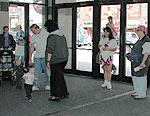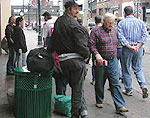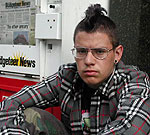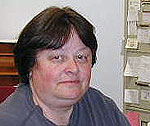By Stephanie Hemphill
Minnesota Public Radio
June 10, 2002
The Duluth city council is considering making it illegal to stand around in certain parts of the downtown. Some merchants say their customers are being frightened off by people who hang out downtown. The two ordinances are designed to make the city's center more attractive to residents and visitors.
| |
|
|
|
||
Store owners in Duluth have been trying to draw people downtown for years.
Many shoppers say it's hard to find a place to park. Some say they're afraid of the homeless people or offended by the teenagers who hang out downtown.
Young people gather every day on Superior Street, near Duluth's busiest bus stop. People wait here to catch a bus, or to transfer from one bus to another. One waiting area is in the Holiday Center, a downtown mall. There are no benches here. They were taken out years ago to discourage people from just sitting around. The classical music piped into the waiting area is also designed to repel teenagers.
But young people still hang out here. They sit on the sidewalk and talk with friends, or stand in groups playing hackeysack.
"This is the main gathering spot of our friends," one youth explains, "because we meet up down here and then we go whichever way we can."
"We have no other place to hang out," another says, "unless we want to chill at somebody's house and even then we can't do that because if we make too much noise, they get evicted. That's not fair."
Some of the young people have purple hair, body piercings, and torn clothing. Some of them swear.
That makes some people waiting for the bus uncomfortable, especially elderly riders.
| |
|
|
|
||
Other people who work or shop downtown say they're bothered by people asking them for money.
One woman says she thinks panhandlers regard anyone carrying a briefcase as fair game.
"There are some that are very persistent and will follow you," she says. "Usually they're drunk, and I think if they were sober they'd know better."
Over the last decade, Duluth has spent millions refurbishing the downtown, bricking the streets and sidewalks and renovating storefronts. But downtown businesses still struggle.
A task force studied the issue for a year. Its recommendations include a pair of proposed ordinances that would allow the city to create zones in front of individual businesses -- mass transit zones where people could only wait for buses... and pedestrian transit zones where people wouldn't be allowed to stand around but could only be walking through.
| |
|
|
|
||
Council member Russ Stewart wrote the two ordinances. He says they would not prohibit panhandling -- he says an anti-panhandling ordinance is difficult to defend in court. But he says these ordinances would allow police to fine or arrest people who won't move along when they're told to.
"Right now," Stewart says, "you have people hanging out in front of establishments that respond 'well, it's my right to be here.' Well it's certainly your right to be on a public street, but in a pedestrian transit zone it won't be your right to block the entryway, you'll have to move along outside that zone and hang out there."
The concerns about downtown come at the same time as rising homelessness in Duluth.
| |
|
|
|
||
Kim Randolph runs a homeless shelter and drop-in center. She says more people are homeless because there isn't enough affordable housing in the city. And she says Duluth is gentrifying its downtown - making more parts of the city attractive to middle-class people. That means people who don't have a home have fewer places to spend their time.
Randolph says some of Duluth's most popular places were once refuges for the city's poor.
"The beach, where they have the Lakewalk now, used to be called "wino beach" and a lot of people spent their days or nights down there," says Randolph. "Leif Erickson Park was another place for people to go sleep and hide out. And our folks are homeless; they don't have apartments. They need places to be."
One downtown merchant says the kids need to be someplace, too. Peter Furo is co-owner of a store selling outdoor gear. He says most of the kids who hang out downtown are good kids; they just need some direction. Furo says the ordinances would be difficult to enforce, and they wouldn't help teenagers who need more supervision.
"I just think there's a different way to approach it," Furo says. "Finding a different place or finding something for those young people to do would go a long way to reducing that."




